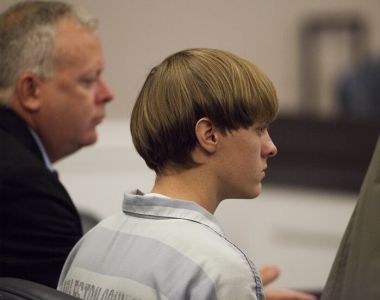Dylann Roof wants to plead guilty in Charleston case, but his lawyer gags him

Dylann Roof, the 21-year-old white man who gunned down nine people inside a Charleston, South Carolina church in cold blood, wants to plead guilty to all the crimes he has been charged with, but his lawyer does not want him to do that—yet.
Defence attorney David Bruck said he is not advising his client to make that plea until prosecutors inform the court on whether or not they'll seek the death penalty.
"Roof has told us he wishes to plead guilty," Bruck told the court. "Until we know whether the government will seek the death penalty, we cannot advise Mr. Roof." Bruck declined to elaborate on why he was making the plea conditional or what plea the defendant would make if the prosecutors demand the death penalty.
Magistrate Judge Bristow Marchant then entered a not guilty plea for Roof, who is facing 33 hate crimes and firearms charges.
Final motions are to be submitted by Aug. 20.
Eduardo Curry, a lawyer for the Emanuel African Methodist Episcopal Church where the killings took place, said, "We believe he understands the tremendous crime that he committed and the heinousness of it."
The charges are in addition to the murder and attempted murder cases filed against Roof on which the suspect has not entered a plea.
Relatives of the victims and survivors attended the hearing.
"For the rest of his life I want him to hear my thoughts," said Tyrone Sanders of Roof. "I am hurting inside for what he is accused of doing," said Sanders, father of victim Tywanza Sanders and husband of Felicia Sanders, who survived. "I want him to think about what I'm thinking and continue to think about it."
Prosecutors have not announced their decision on the death penalty against Roof.
After a federal grand jury indicted Roof on the 33 counts, US Attorney General Loretta Lynch said Roof planned to increase racial tensions and seek retribution against African Americans.
"To carry out these twin goals of fanning racial flames and exacting revenge, Roof further decided to seek out and murder African-Americans because of their race. An essential element of his plan, however, was to find his victims inside of a church, specifically an African-American church, to ensure the greatest notoriety and attention to his actions," she said.
Lynch added that in deciding where the government will seek the death penalty, they will "thoroughly consider all factual and legal issues relevant to that decision, which will necessarily involve counsel for the defendant Roof."
"In addition, consultation with the victims' families is an important part of this decision making process and no decision will be made before conferring with them," she said.











